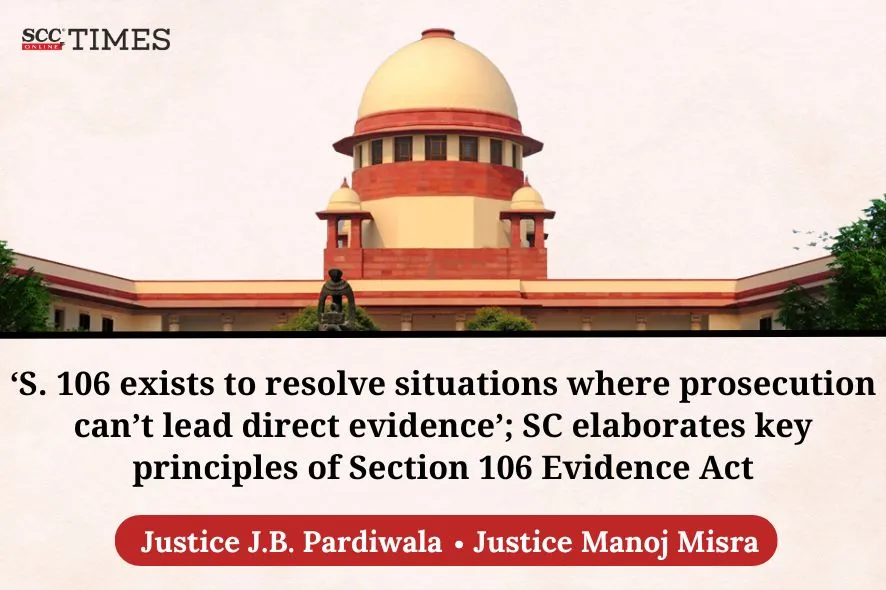Supreme Court: While considering the instant appeal challenging the accused husband’s acquittal in the case concerning his wife’s death under mysterious circumstances 22 years ago (2003); the Division Bench of J.B. Pardiwala* and Manoj Misra, JJ., upon perusing the facts of the case, found that the circumstances in the case constitute more than a prima facie case to enable the prosecution to invoke Section 106 of the Evidence Act and shift the burden on the accused husband to explain what had happened on the day & date his wife died. The Court opined that the prosecution duly established the foundational facts, thereby justifying the invocation of Section 106, Evidence Act. The Court while determining the matter, reiterated the foundational principles regarding testimony of a child witness and convictions based on circumstantial evidence. Hence, the accused husband’s acquittal was set aside and his conviction and sentence by the Trial Court was restored.
The Court pointed out that if an offence takes place inside the four walls of a house and in such circumstances where the accused has all the opportunity to plan and commit the offence at the time and in the circumstances of its choice, it will be extremely difficult for the prosecution to lead direct evidence to establish the guilt of the accused. It is to resolve such a situation that Section 106 of the Evidence Act exists in the statute book.
Background:
On the night of 15-7-2003, the complainant along with his father and relatives heard cries and screams of the deceased coming from the house of the accused. After some time, the screams of the deceased stopped. At about in the morning, they learnt from the other inhabitants of the village that the deceased had died during the night and that her body had been cremated.
After the matter was investigated, a chargesheet was filed against the accused husband and his sister for commission of offences under Sections 302, 201 read with Section 34 of the IPC.
The Trial Court upon perusal of the evidence, circumstances and witnesses (including a child witness), found the accused husband guilty, convicting and sentencing him to undergo rigorous imprisonment for life with fine of Rs. 1,000 for the offence punishable under Section 302 IPC and four years of rigorous imprisonment along with fine of Rs. 2,000 for the offence punishable under Section 201 of the IPC.
Aggrieved with the afore-stated decision of the Trial Court, the accused appealed before Madhya Pradesh High Court. The High Court via the impugned judgment of 2010, acquitted the accused and set aside the Trial Court’s order of conviction finding that the testimony of the child witness, (PW6), was unreliable and tutored.
Upon perusing the case, facts and evidence of the prosecution and reasoning of the High Court in acquitting the accused husband, the Court deemed it fit to examine the following principles:
Principles governing Applicability of Section 106 of the Evidence Act
-
Referring to Section 106 of the Evidence Act, the Court pointed out that the Section provides that when any fact is especially within the knowledge of any person, the burden of proving that fact is upon him. Section 106 of the Evidence Act is an exception to Section 101 of the Evidence Act. Section 101 with its illustration (a) lays down the general rule that in a criminal case the burden of proof is on the prosecution and Section 106 is certainly not intended to relieve it of that duty. On the contrary, it is designed to meet certain exceptional cases in which it would be impossible or at any rate disproportionately difficult for the prosecution to establish the facts which are, “especially within the knowledge of the accused and which, he can prove without difficulty or inconvenience”.
-
The Court should apply Section 106 of the Evidence Act in criminal cases with care and caution. It cannot be said that it has no application to criminal cases. The ordinary rule which applies to criminal trials in this country that the onus lies on the prosecution to prove the guilt of the accused is not in any way modified by the provisions contained in Section 106 of the Evidence Act. Section 106 cannot be invoked to make up the inability of the prosecution to produce evidence of circumstances pointing to the guilt of the accused. This Section cannot be used to support a conviction unless the prosecution has discharged the onus by proving all the elements necessary to establish the offence. Until a prima facie case is established by such evidence, the onus does not shift to the accused.
-
Section 106 has no application to cases where the fact in question, having regard to its nature, is such as to be capable of being known not only to the accused but also to others, if they happened to be present when it took place. The intention underlying the act or conduct of any individual is seldom a matter which can be conclusively established; it is indeed only known to the person in whose mind the intention is conceived.
-
Section 106 of the Evidence Act would apply to cases where the prosecution could be said to have succeeded in proving facts from which a reasonable inference can be drawn regarding guilt of the accused.
The Court thus pointed out the offence in the instant case took place inside the four walls of the house in which the accused, the deceased and their 7-year-old daughter (PW6) were living. The accused has not disputed his presence in the house at the time of the alleged incident. Furthermore, the accused failed to inform the family members about the death of their daughter and the clandestine manner in which her body was cremated, more particularly when her family members were residing in the very same village. The Court took note of the accused’s dubious conduct in fleeing away from home leaving behind his minor daughter of seven years age all alone; deceased untimely death after a marital dispute and failure of the accused to explain incriminating circumstances.
Appreciation of Circumstantial Evidence
-
The Court reiterated that there can be no straight jacket formula for appreciation of circumstantial evidence, yet to convict an accused on the basis of circumstantial evidence, Courts must follow certain tests that were framed in Sharad Birdhichand Sarda v. State of Maharashtra, (1984) 4 SCC 116.
-
In a case of circumstantial evidence, the judgment remains essentially inferential. The inference is drawn from the established facts as the circumstances lead to particular inferences. The Court has to draw an inference with respect to whether the chain of circumstances is complete, and when the circumstances therein are collectively considered, the same must lead only to the irresistible conclusion that the accused alone is the perpetrator of the crime in question. All the circumstances so established must be of a conclusive nature, and consistent only with the hypothesis of the guilt of the accused.
-
In the instant case, the Court took note of several incriminating circumstances, such as failure on the part of the accused husband in not explaining in any manner as to what had actually happened to his deceased wife i.e., or how she died on the fateful night of the incident, more particularly when he did not dispute that he was in the company of his wife at the relevant point of time. The Court further pointed out the unnatural conduct of the accused in not informing the family members either about the death of their daughter or the cremation of her body, despite the fact that her family members were residing in the very same village. Furthermore, the suspicious circumstances of death and fight between the accused and deceased 2-3 days before the incident, all of which were corroborated.
Conclusion and Decision:
The Court pointed out that the High Court completely failed to advert to and refer to Section 106 of the Evidence Act, which was crucial in a case involving circumstantial evidence.
The Court observed that cases are frequently coming before the Courts where the husbands, due to strained marital relations and doubt as regards the character, have gone to the extent of killing the wife. These crimes are generally committed in complete secrecy inside the house and it becomes very difficult for the prosecution to lead evidence. “No member of the family like in the case on board, even if he is a witness of the crime, would come forward to depose against another family member”. It was further observed that the role of courts in such circumstances assumes greater importance and it is expected of the courts to deal with like one on hand, cases in a more realistic manner and not allow the criminals to go scot-free on account of procedural technicalities, perfunctory investigation or insignificant lacunas in the evidence as otherwise serious crimes would go unpunished. The courts are expected to be sensitive in cases involving crime against women.
Hence the Court found the instant case to be fit for the prosecution to invoke Section 106 of the Evidence Act and set aside the accused husband’s acquittal and directed the accused to surrender before the Trial Court within a period of four weeks from 24-2-2025 to undergo the sentence as imposed by the Trial Court.
Also Read:
CASE DETAILS
|
Citation: Appellants : Respondents : |
Advocates who appeared in this case For Petitioner(s): For Respondent(s): |
CORAM :









